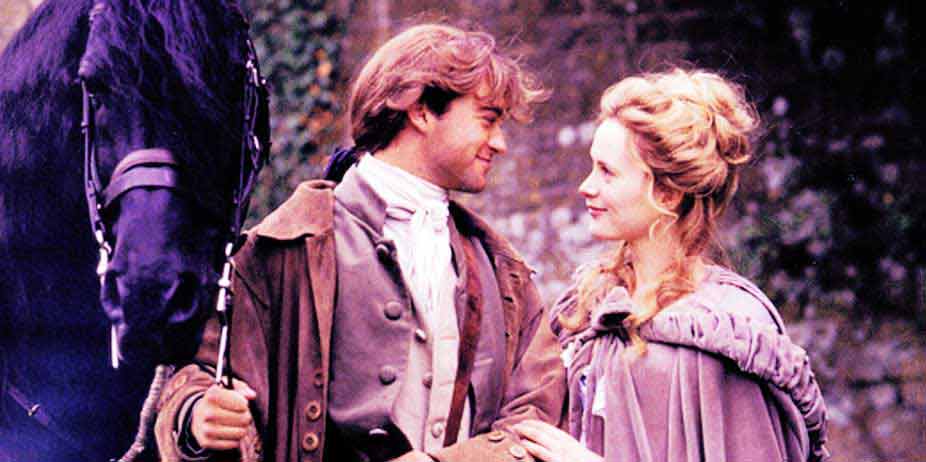 The Clandestine Marriage (1999)
The Clandestine Marriage (1999)
The Georgian era is a popular period for romantic dramas and comedies, perhaps because the style of the age itself was one of frivolity, powdered wigs, and pompous feathered hairstyles. The Clandestine Marriage is a film that succeeds as a comedy, but fails in the area of pleasurable viewing. While the costumes are lovely and the acting at times brings a smile to one's face, the moral flaws are too prominent to be overlooked and it doesn't hold a candle to Wilde. This is a case where the film might have been a classic, but gets bogged down in slowly-unfolding side plots and content issues.
The beginning scene is quite promising, where we're informed that the only place two young people may be wed without parental consent is the debtor's prison. Fanny (Natasha Little) the younger daughter of a wealthy man of little good breeding, and her father's secretary Richard (Paul Nicholls) are married by a local cleric about to have his neck strung, and return to the country estate attempting to figure out how to break the news to dear old dad (Timothy Spall). The house is in an uproar over the approaching wedding of Fanny's plain older sister Betsy (Emma Chambers) to a young lord of title but very little funding. He's due to arrive sometime in the late afternoon, and Fanny's father Sterling is going all out in order to impress his elusive guests. One of the man's fascinations is clocks and he's forever toying with them, much to the irritation of his widowed sister Mrs. Heidelberg (Joan Collins). Richard has long served the family and most of the servants know his passion for Fanny, but Sterling insists marriage is out of the question.
When the anticipated guests arrive, Lord Ogleby (Nigel Hawthorne) takes an immediate shine to Fanny, who also attracts the interest of the would-be-bridegroom (Tom Hollander). Suddenly a simple family affair becomes a major disaster, as not one, but two men propose marriage to an already-married Fanny! Her husband is wracking his brain to figure out how they can break the news to irate in-laws. Her sister is convinced Fanny has deliberately set out to ruin her. Sterling is worried his water clock won't work properly for the big finale. And the maid has become overly attached to Lord Ogleby's Negro valet. It's a social time bomb waiting to go off, a blend of ironic humor, mistaken loyalties, and sibling rivalry. While the cast is quite good and the costuming and setting breathtaking, there's something about the movie that rubbed me the wrong way.
As much as Georgian pieces promise romance, they also tend to be on the bawdy side and I'm sorry to say this was no exception. The movie is full of subtle innuendoes meant for laughs, much conversation about women's breasts (lingering looks, cleavage, and a seemingly-innocent conversation about babies) and several blatantly sexual scenes. They might have been overlooked or forgiven if the rest of the film had held up well to scrutiny, but attempting to become humorous the movie swiftly becomes ridiculous. In some respects it models Shakespeare's Twelfth Night, though even that story had more redeeming value. First we see Richard madly in love with Fanny, and enjoy his torment as he discovers everyone else would love to marry her. We observe the painful declaration of love by Sir John, and the humiliation of Lord Ogleby when he mistakes Fanny's intent to bring him in on the scheme for her insinuating she would like to marry him!
The ending conclusion has the men bartering with Sterling for the girls... offering to take less money if they can have Fanny, demanding more if he wants Betsy part of the family name. Ogleby's servant, who has a reputation as a playboy, is taken advantage of by one of the maids. Their romantic pursuits (can anyone say rape?) wind up the brunt of a joke I saw coming... when they're trapped in a very embarrassing situation. I found it all rather offensive, even if it was meant in "good fun." Viewers should note that while profanity is almost nonexistent (a few uses of "Good God!") and there's very little violence, there's a clothed sex scene (one of the partners is unwilling) interplayed with the evening's entertainment. In a scan of bedrooms during the night, we also see the newlyweds actively taking advantage of their martial rights. There's also a joke involving Lord Ogleby taking a leak behind a bush in the garden. (He's joined by five or six gardeners.)
Though only 86 minutes in length, the movie seemed to drag on and the offensive content was over the top. If you want a romantic comedy, rent The Importance of Being Earnest instead, which relies on wit rather than vulgarity to make you laugh. Or better yet, stay with the Georgian period and see The Scarlet Pimpernel. Sir Percy is guaranteed to brighten anyone's day.
